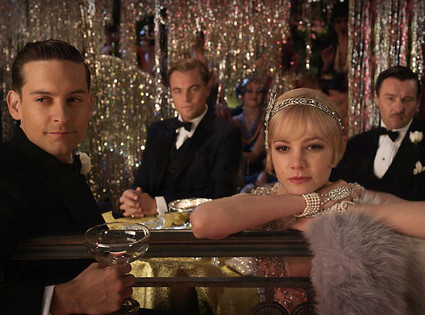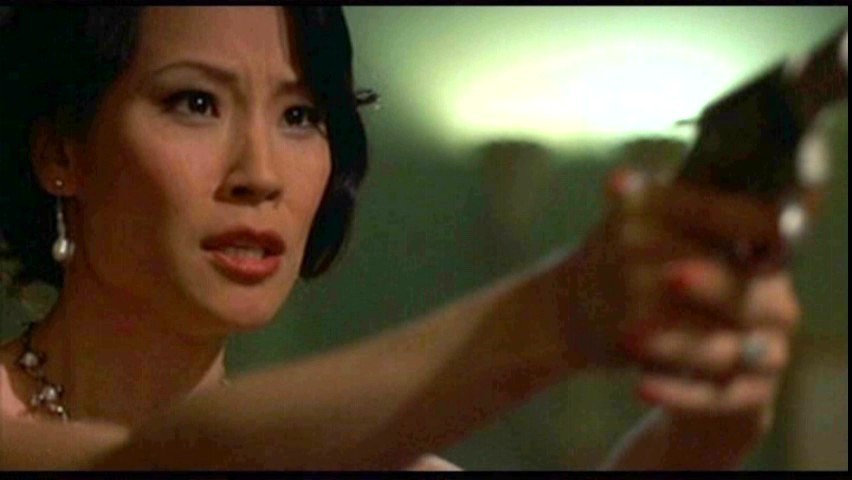"...You are about to hear a story of murder, greed, lust...all those things we hold dear to our hearts."
-The MC
 |
| "In case you shake apart and want a brand new start to do that jazz." |
It is in prison that she meets the famous Velma Kelly (the woman on the left in the above), a performer-turned-murderess who has become famous for the brutality of her crime. Kelly shirks Roxie's fangirl behavior at first, but when Roxie teams up with Velma's lawyer, the silver-tongued Billy Flynn (pictured in the center), she gains her own stardom, as Flynn turns her crime into an even bigger treasure than Kelly's.
Flynn works the press like puppets in the song "Both Reached for the Gun."
Roxie goes on to become a superstar within prison walls, surpassing Velma Kelly with her celebrity. The public goes wild when the two decide to team up, fulfilling Roxie's long-time wish of being a famous performer, and regaining Velma's celebrity (which Roxie had snatched entirely).
 |
| Adele's hit song "Rumour Has It" is a great fit for Gatsby, as it deals with the flagrant and infectious nature of rumors. |
 Gatsby is, in many ways, very similar to the heroine of Chicago, Roxie Hart. Both are from poor roots. Both move to the East in search of a more exciting life (Gatsby from the West and Roxie from Mississippi [or so she claims to the media!]). And, most importantly, both have dreams of a better lifestyle that they achieve through criminality. The flashy and lavish nature of their success is seen on the left, in this scene from The Great Gatsby, showing one of Gatsby's parties. An interesting point about both the East and the American Dream is made in the similarity between Roxie and Jay's stories.
Gatsby is, in many ways, very similar to the heroine of Chicago, Roxie Hart. Both are from poor roots. Both move to the East in search of a more exciting life (Gatsby from the West and Roxie from Mississippi [or so she claims to the media!]). And, most importantly, both have dreams of a better lifestyle that they achieve through criminality. The flashy and lavish nature of their success is seen on the left, in this scene from The Great Gatsby, showing one of Gatsby's parties. An interesting point about both the East and the American Dream is made in the similarity between Roxie and Jay's stories.Regarding the East, both Fitzgerald and Ebb/Fosse emphasize the powerful criminal cultures there. In Gatsby’s case, Meyer Wolfsheim and his ilk provide the criminal element that leads to Gatsby’s great fortune. And in Roxie’s, her frenzied murder of her lover leads to her eventual fame. As both of these characters migrated from areas of the country they regarded as more boring and slow-paced when compared to the East, the similar way in which the East challenges them makes a statement. It argues that the faster, more wild life that the East promises is not for everyone, and that any dreams one hopes to procure there will come with a price. However, it also seems that the East is a place where normally malevolent deeds are not just allowed, but celebrated. In both of their cases, criminality is a road to success, corrupting the classically pure take that the American Dream usually is associated with.
 |
| In "Chicago," the song "Cell Block Tango" is an excellent medium that connects the frequent criminality seen in the East with the celebrated and, in this case, seductive nature of the crimes. |
For Gatsby, his funeral is very nearly a no-show, showing that, ironically, his mystique lied purely in the mystery of his origins. Without his criminality to gossip about, the guests who flocked to his house every night for parties could care less about him.
And for Roxie, her stardom inevitably fades when yet another hotheaded young woman commits a vicious murder in Chicago, usurping Roxie’s throne and pushing her back into the anonymity that she dreamed so long of escaping. Her fame, as Flynn taunts towards the end of the show, was “a flash in the pan.”
 |
Kitty Baxter, the latest murderess blowing up the Chicago papers with headlines as:
BULLETS AND BROADS! ANOTHER DAY, ANOTHER MURDER!
|

I think this was a really cool parallel to the text of The Great Gatsby. In both, we see this "celebration" of criminality and of mystery/intrigue. Furthermore, putting on a show, or giving 'em the old "razzle dazzle" is a huge aspect of both pieces. I think it would be interesting to compare Velma and Roxie in terms of how they relate to the East Egg/West Egg conflict. Roxie sort of worked her way up as a performer/criminal, and Velma has really always been a performer. Velma has a certain ease or entitlement about her status, just like the East Eggers have a certain "ease of wealth". You can also see this reflected in Fosse's choreography. In Velma's numbers, such as All That Jazz, you see the typical smooth, easy, and sexy Fosse moves that people are familiar with, but with Roxie's numbers, such as Me and My Baby, there's something a little bit too big or gaudy about the movement.
ReplyDeleteI do think an expansion of Tron's discussion might include more about the idea of performance and the public nature of celebrity and criminality.
Delete(Gray, I love how you READ the choreograhpy in support of thematic analysis in your comment here!)
I love the idea that crime is not only "allowed, but celebrated." It brings a great twist to the Great Gastby and even makes me consider how Myrtles/ Gatsby's death would be accepted in the papers.
ReplyDeleteI think it is really cool that you related the text to a show off of broadway, especially with how many references there are to acting and show business in The Great Gatsby. I love the way it furthers the image of Gatsby's entire life as an act, and even as an act aimed at improving business. I also love the explanation for the ending of the book that this post provides.
ReplyDeleteI like your point about how Fitzgerald is critiquing the supposed egalitarian American Dream because it is inherently corrupt. In Gatsby, the fraud is exposed by focusing on how those who have gone "from rags to riches" achieved their success through, as you said, underhanded means. And this overarching theme of deceptive social equality is also examined from the other side of the class system in The Bluest Eye, where Toni Morrison critiques the traditional view of the American Dream by showing that no, all men are not created equal and that there is a part of this country that is supposed to have the same access to this dream, yet basically has no voice. I think the "American Dream," or lack thereof is one of the most interesting topics that we can talk about in all our Spring Term books.
ReplyDeleteagreed, mehek. we might think, in terms of the final essay, about what the best way to talk about this "AD or lack thereof" is?
Deletecorruption of the American dream
myth, fantasy of the American dream
nightmare of the American dream
also, what specific aspects of US culture and history make the dream a nightmare, fantasy, or myth?